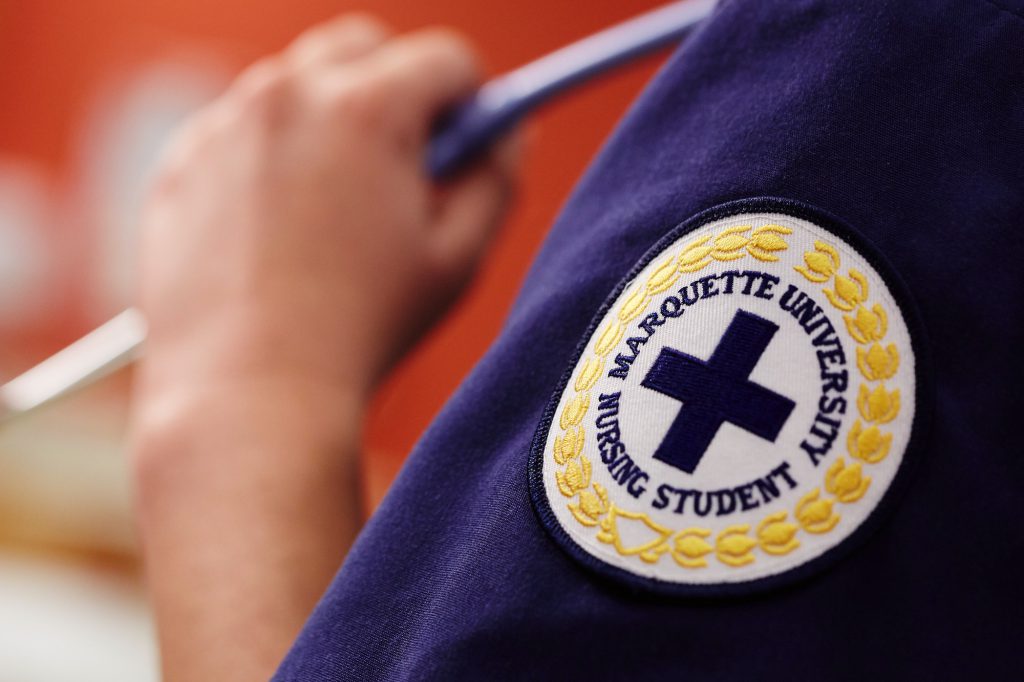Marquette College of Nursing receives nearly $1 million grant to boost eldercare workforce
MILWAUKEE — The College of Nursing at Marquette University has been awarded a grant of nearly $1 million from the U.S. Department of Health and Human Services’ Health Resources and Services Administration to create a new program and provide student scholarships to strengthen the eldercare workforce.
The Health Resources and Services Administration (HRSA) grant, totaling just over $975,000 over the course of two years, will support the formation of a Nursing Workforce Diversity-Eldercare Enhancement — or “NWD-E2” — program and provide scholarships to nursing students from underrepresented backgrounds seeking careers in eldercare. The NWD-E2 program, which will operate in partnership with the Wisconsin Geriatric Education Center, the Milwaukee VA Clinic Network and the VA Home Base Primary Care program, aims to diversify and boost the eldercare workforce in underserved rural and urban communities.
“The goal of the NWD-E2 program is to uniquely transform the eldercare system by targeting the needs — particularly the disparities related to access and delivery of care — present within underserved communities, while simultaneously benefiting students from disadvantaged backgrounds,” said Dr. Terrie Garcia, NWD-E2 project director and coordinator of workforce diversity in the College of Nursing. “Furthermore, the underlying social justice mission of this project commits the College of Nursing to growing nursing workforce diversity and serving vulnerable populations beyond the grant period, which is a powerful and inspirational premise in the higher education space.”
A portion of the HRSA grant will be awarded as scholarships and stipends to eligible nursing students. Scholarship recipients will commit to a two-year program of eldercare training, beginning as sophomores this year and continuing as juniors in the 2021–22 academic year. In addition, a select clinical cohort of up to eight students will participate in a new clinical rotation, providing home-based primary care to elderly veterans in rural and urban communities.
Dr. Stacy Barnes, associate professor of nursing and director of the Wisconsin Geriatric Education Center, said the college is “excited about the grant and for the opportunity for the college to expand its eldercare educational offerings, as geriatrics is a sector of health care that is greatly important, yet often not prioritized in health profession programs. This new grant is an incredibly valuable resource that will create new possibilities for nursing students, as well as a stronger eldercare workforce, which is much needed.”
Dr. Janet Wessel Krejci, dean of the College of Nursing, said the grant underscores the efforts of the university and the College of Nursing to address areas for improvement within the health care system and better serve diverse communities.
“This grant and this new program will bring about advantages for students and patients alike, now and into the future,” Wessel Krejci said. “It also supports workforce diversity, which is one of the college’s priorities because a more diverse network of nurses will lead to better health care experiences and outcomes.”
The HRSA grant and the NWD-E2 program build on an existing nursing workforce diversity project that served nearly 100 selected B.S.N. students during the 2019–20 academic year.
NOTE: This press release was submitted to Urban Milwaukee and was not written by an Urban Milwaukee writer. While it is believed to be reliable, Urban Milwaukee does not guarantee its accuracy or completeness.
Mentioned in This Press Release
Recent Press Releases by Marquette University
New Marquette Law School Poll finds large majority of Wisconsin voters not yet tuned in to who is running in major 2026 elections
Oct 29th, 2025 by Marquette UniversityNo candidate has established strong position in public favorability in governor, state Supreme Court races; large majorities of voters undecided
New Marquette Law School National Survey Finds Large Majority Think Political Violence is a Big Problem, But With Sharp Partisan Differences
Oct 1st, 2025 by Marquette UniversityAmericans are overall pessimistic on reducing intense political conflict; half of those polled say heated language by leaders makes violence more likely























